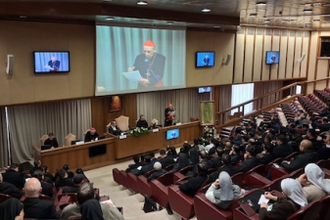Sunday Reflection with Canon Robin Gibbons - 22 September 2024

Stadtkirche_St._Wenzel_(Naumburg)
Twenty-fifth Sunday in Ordinary Time - Lectionary: 134
Why is it we find those simple teachings of Jesus so difficult to put into practice?
After all this passage from Mark is clear, direct and unequivocal isn't it?
"Then he sat down, called the Twelve, and said to them, "If anyone wishes to be first, he shall be the last of all and the servant of all."jTaking a child he placed it in their midst, and putting his arms around it he said to them, 'Whoever receives one child such as this in my name, receives me; and whoever receives me, receives not me but the One who sent me.'(Mk 9: 35-37)
Perhaps it is the image of the child that disconcerts us, and given the litany of child abuse in Church and so many other Institutions we are wise to feel uneasy. In the light of history the Church has not been a good , capable steward of the little ones, and the gross abuse of power and control under the form of abuse has been an appalling stain on our faith community. Nobody should excuse it, but neither can we remain stick in a situation of hand wringing, blame and name-calling. Instead we have to act. It is clear from these words of Jesus that whatever we do to another is done to the Lord himself, who is bound together with each and every one of us.
Perhaps we all, without exception, really need to examine our 'modus operandi' in contemporary society. Catholicism is not supposed to be a kill-joy faith, but neither is it supposed to let us behave towards others in ways or manners that suggest we have adopted the lowest common denominator of civilised discourse. Nor are we bidden to dominate others in an unthinking, rude or confrontational way. There is a gentle and powerful realism in Jesus, who tells us to deal with others from the situation they are in and as we find them, that is where they as equals who like us are on their journey towards maturity in personality and faith. But we are bidden to do as Christ always does, from that situation of equality and respect towards others, done always with courtesy and the deference of love.
Alas, this is not what we often find in the public arena nor even in the Church. Ask yourself this question, how many times have I heard clergy berating me, or those with me from the bully pulpit? Maybe not many times, for most priests have a sense of vocation in this sphere. But there are others whose arrogance is breath taking and they cause much harm by their unthinking words. Often ill thought out words have a dark capacity to turn people off religion and away from Church, people vote with their feet! But we do have an antidote, it lies within ourselves, in our attitude and openness and in our acceptance of creating a humble and contrite heart. There is a big difference between a Pharisee and a Prophet, and an even greater one between a Pharisee and humble publican. We can only make that prayer of humility, 'have mercy on me a sinner' our own.
Preaching as Jesus shows us, is about the Good News. It is not a catechesis of sins or faults which end up berating the sinner or their actions in public, humiliating them and giving guilt trips for the faithful. Nor is it the personal opinion or bias of the one preaching, that leads to falsehood. We are warned by Christ that control over others exercised by those in power, has been, and is, the abuse of faith towards the little ones and needs calling out. So as a way of dealing with this we need to note these words of Jesus a little more carefully and actually act on them, confront others in truthful sincerity with a gentle manner using the gifted words of scripture as a guide such as in this exchange of Jesus with his disciples: 'They came to Capernaum and, once inside the house, he began to ask them, "What were you arguing about on the way?"' But they remained silent. They had been discussing among themselves on the way who was the greatest" ( Mk 9: 33-34). Now try to substitute that word 'greatest' with 'those in power', ' those in control', 'those who assume that they are right' and we are getting close to that breakthrough Jesus asks us to make with ourselves. If we can do anything to create an atmosphere of trust, openness, care for others and a sense of seeking factual truth, then Christ's words are the way. We need , as he does, to confront evil, call out those who harm, denigrate , make our faith a burden on others, and instead work for the sake of the Kingdom, not the institution, and do it with joy and love, but let us always start with ourselves!
The little children of Jesus are the most vulnerable in our world, they are never found in positions of power, because they are down trodden, they are not seen as the greatest because the great make sure they hog the limelight and keep these little ones hidden, but they really are those blessed and loved by God, and moreover it is they who hold the secret of the keys of the Kingdom and not us! Amen
Lectio Divina
Jas 3:16-4:3
Beloved:
Where jealousy and selfish ambition exist,
there is disorder and every foul practice.
But the wisdom from above is first of all pure,
then peaceable, gentle, compliant,
full of mercy and good fruits,
without inconstancy or insincerity.
And the fruit of righteousness is sown in peace
for those who cultivate peace.
Where do the wars
and where do the conflicts among you come from?
Is it not from your passions
that make war within your members?
You covet but do not possess.
You kill and envy but you cannot obtain;
you fight and wage war.
You do not possess because you do not ask.
You ask but do not receive,
because you ask wrongly, to spend it on your passions.
Saint Vincent De Paul
To use our intelligence and reason well, it must be our inviolable rule to judge everything as Our Lord did; but, I repeat, always and in all things, and to ask ourselves, if need be, "How did Our Lord judge this? How did he act in a similar situation? What did he say about it? I have to adjust my way of acting to his teachings and examples." Let's be determined to do that, Messieurs, let's walk on this path with assurance; it's a royal rule; heaven and earth will pass away, but his words will not pass away ... Oh, if God grants us the grace of adopting this practice of never judging with human reasoning because it never arrives at the truth, never attains God or divine reasons, never; if, I repeat, we consider our reason alone as deceptive and we act according to the Gospel, let's bless Our Lord, my dear confreres, and strive to judge as he did and to do what he has recommended by word and example. Not only that, but let's enter into his mind so that we may enter into his workings. Doing good isn't everything; we have to do it well, after the example of Our Lord, of whom it's said in the Gospel that he did all things well: Bene omnia fecit. Fasting, keeping the Rules, turning our attention to God isn't everything; we have to do all that in his spirit, that is, with perfection, with the purpose and appropriateness with which he himself did them. So then, prudence consists in judging and acting as Eternal Wisdom judged and acted (CCD:XII:148).


















